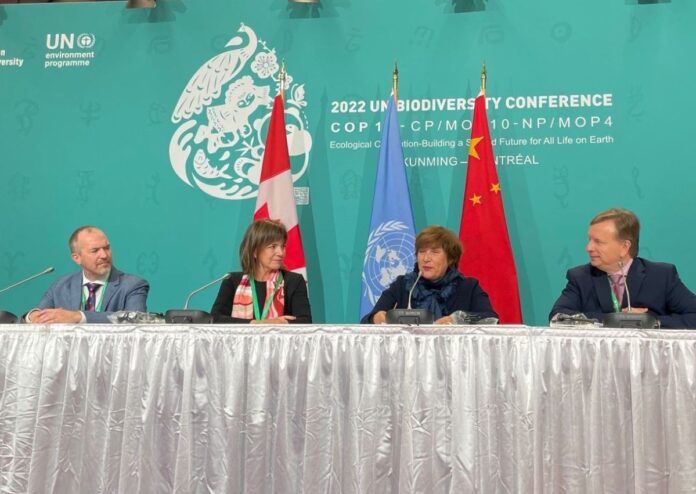Zoritsa Urosevic, Executive Director at UNWTO and Special Representative to the United Nations in Geneva speaking during COP15. She is accompanied by Julia Simpson, WTTC President & CEO and Glenn Mandziuk, CEO at the Sustainable Hospitality Alliance. Photo source: UNWTO
COP15, the 15th meeting of the Conference of the Parties to the UN Convention on Biological Diversity, on Monday saw the Travel & Tourism sector commit to stop and reverse biodiversity loss.
During COP15 in Montreal, the World Travel & Tourism Council (WTTC), United Nations World Tourism Organization (UNWTO) and the Sustainable Hospitality Alliance* announced a new collaboration which will bring together the public and private sectors in a shared vision to halt and reverse biodiversity loss by 2030.
The vision sees the global Travel & Tourism sector supporting and inspiring governments, businesses, and society to implement the post-2020 Global Biodiversity Framework and help to transform our relationship with the natural world.
Signatories to the vision have committed to adopt a nature positive approach to tourism through integrating biodiversity safeguards by reducing carbon emissions, the impact of pollution, the unsustainable use of resources, and by protecting and restoring nature and its wildlife.
Travel and nature are linked, wildlife tourism creates over $340bn
“Travel and nature are intrinsically linked. Millions of people travel to explore nature and feel a connection they cannot get through computer screens,” WTTC President & CEO Julia Simpson said, adding that wildlife tourism creates over US $340 billion each year and supports more than 21 million jobs around the world.
“Today’s collaboration between WTTC, UNWTO and the Sustainable Hospitality Alliance, spearheading the sector’s vision to halt and reverse nature loss by 2030, shows our commitment to preserve the planet for future generations,” she said.
This collaboration follows the release of WTTC’s ‘Nature Positive Travel & Tourism’ report, which was created jointly with ANIMONDIAL, and focuses on halting and reversing damage to nature so the living world can recover from its current depleted state. This involves minimising ongoing harm and taking positive action to restore nature to produce an overall benefit to biodiversity and help achieve Net Zero.
Almost 150 organisations have signed up to the vision so far including international hotel groups, tour operators, travel agents, destinations, and international wildlife charities.
Complementing the power of the private sector, UNWTO, as the voice of tourism at the global governance level, will work to bring governments and international organisations on board and announce the shared vision of tourism as a pillar of wildlife conservation and habitat protection.
The vision forecasts a future where governments implement policies that integrate biodiversity safeguards throughout their operations and the supply chain. The vision will also enable the sector to take action to avoid or minimise negative impacts on nature and play a proactive role in the protection and restoration of biodiversity.
Integral to this will be an enhanced recognition of the importance of clean oceans for sector, with around 40 percent of the global ‘Blue Economy’ related to tourism, according to UNWTO data.
The three bodies are calling on Travel & Tourism bodies to adopt the vision. Organisations can show their commitment here.
* The Sustainable Hospitality Alliance was launched in 2020 and brings together engaged hospitality companies and uses the collective power of the industry to deliver impact locally and on a global scale.
Follow GTP Headlines on Google News to keep up to date with all the latest on tourism and travel in Greece.













